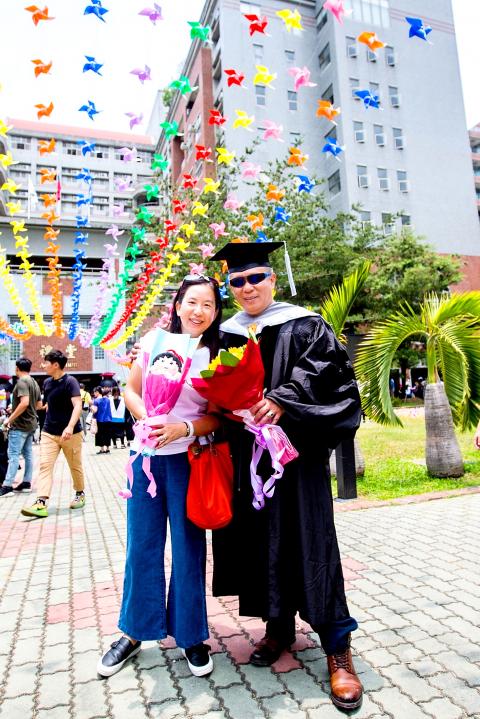Chio Tian Folk Drums and Arts Troupe founder Hsu Chen-jung (許振榮) said he is working on a doctorate because the Executive Yuan’s Council for Cultural Affairs does not respect the troupe.
Hsu on June 9 submitted his doctoral thesis to Chaoyang University of Technology’s College of Management. He must pass his oral defense next month before he can be conferred a doctorate in Industrial Development Strategy.
Hsu said he received a great deal of support from assistant professor Lin Mao-hsien (林茂賢), who teaches Taiwanese languages and literature at National Taichung University of Education.

Photo courtesy of the Chio Tian Folk Drums and Arts Troupe
With Lin’s encouragement, he was determined to succeed, Hsu said, adding that his greatest hope is to change the “stubborn mindset” of professional academics and to allow young people in the performance arts to have the opportunity to stand out.
Hsu, 53, started the troupe 24 years ago, accepting troubled teenagers and those from low-income families, and teaching them to play drums as a way to release energy.
As the drummers grew more proficient, they became recognized within the performing arts sphere and started receiving invitations to perform in Taiwan and abroad.
In 2012, the story of the troupe became the subject of the 20th Century Fox film Din Tao: Leader of the Parade (陣頭) directed by Taiwanese director Feng Kai (馮凱).
However, when Hsu applied to the council 12 years ago for recognition of the troupe as one of the nation’s outstanding performance groups, the council rejected his application on the grounds that he had only a high-school education, and the majority of the troupe were junior-high school graduates.
The council viewed him as a gang leader, rather than as performance troupe leader, and used a hostile tone with him, he said, adding that he could not accept such an insult.
He spent the following 12 years completing an undergraduate program, obtaining a master’s degree and going through the doctoral program.
“Only through education can [you] change the current state of things,” Hsu quoted Lin as telling him.
Hsu required that the troupe’s main leadership all acquire at least master’s degrees, himself completing courses at Mingdao University, Ling Tung University — as well as an EMBA at Ling Tung University — and Chaoyang University of Technology.
At one point, he thought he might give up, Hsu said, citing an exhausting work and study schedule that left him with no down time.
However, realizing that he must set an example for his son, who had just been accepted to attend Taipei National University of the Arts, he persisted, Hsu said.
Assistant troupe leaders Lee Kuang-cheng (李光正) and Chen Shih-min (陳世旻), as well as Hsu’s son, who is responsible for creative direction, have all obtained master’s degrees, he said, adding that Lee is to start a doctoral program later this year.
Hsu has been accepted into the Public Construction Commission’s list of experts, and said he looks forward to assisting young people.

Chinese Nationalist Party (KMT) Chairman Eric Chu (朱立倫), spokeswoman Yang Chih-yu (楊智伃) and Legislator Hsieh Lung-chieh (謝龍介) would be summoned by police for questioning for leading an illegal assembly on Thursday evening last week, Minister of the Interior Liu Shyh-fang (劉世芳) said today. The three KMT officials led an assembly outside the Taipei City Prosecutors’ Office, a restricted area where public assembly is not allowed, protesting the questioning of several KMT staff and searches of KMT headquarters and offices in a recall petition forgery case. Chu, Yang and Hsieh are all suspected of contravening the Assembly and Parade Act (集會遊行法) by holding

PRAISE: Japanese visitor Takashi Kubota said the Taiwanese temple architecture images showcased in the AI Art Gallery were the most impressive displays he saw Taiwan does not have an official pavilion at the World Expo in Osaka, Japan, because of its diplomatic predicament, but the government-backed Tech World pavilion is drawing interest with its unique recreations of works by Taiwanese artists. The pavilion features an artificial intelligence (AI)-based art gallery showcasing works of famous Taiwanese artists from the Japanese colonial period using innovative technologies. Among its main simulated displays are Eastern gouache paintings by Chen Chin (陳進), Lin Yu-shan (林玉山) and Kuo Hsueh-hu (郭雪湖), who were the three young Taiwanese painters selected for the East Asian Painting exhibition in 1927. Gouache is a water-based

Taiwan would welcome the return of Honduras as a diplomatic ally if its next president decides to make such a move, Minister of Foreign Affairs Lin Chia-lung (林佳龍) said yesterday. “Of course, we would welcome Honduras if they want to restore diplomatic ties with Taiwan after their elections,” Lin said at a meeting of the legislature’s Foreign Affairs and National Defense Committee, when asked to comment on statements made by two of the three Honduran presidential candidates during the presidential campaign in the Central American country. Taiwan is paying close attention to the region as a whole in the wake of a

OFF-TARGET: More than 30,000 participants were expected to take part in the Games next month, but only 6,550 foreign and 19,400 Taiwanese athletes have registered Taipei city councilors yesterday blasted the organizers of next month’s World Masters Games over sudden timetable and venue changes, which they said have caused thousands of participants to back out of the international sporting event, among other organizational issues. They also cited visa delays and political interference by China as reasons many foreign athletes are requesting refunds for the event, to be held from May 17 to 30. Jointly organized by the Taipei and New Taipei City governments, the games have been rocked by numerous controversies since preparations began in 2020. Taipei City Councilor Lin Yen-feng (林延鳳) said yesterday that new measures by